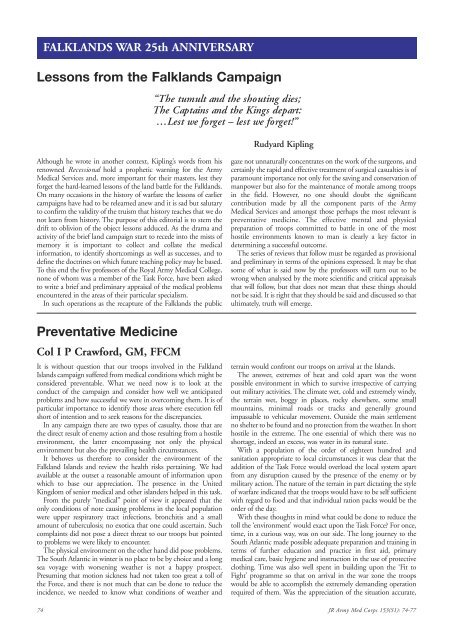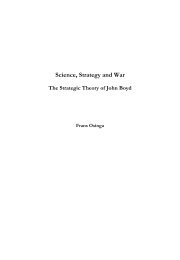Falklands war 25TH anniversarY - Boekje Pienter
Falklands war 25TH anniversarY - Boekje Pienter
Falklands war 25TH anniversarY - Boekje Pienter
Create successful ePaper yourself
Turn your PDF publications into a flip-book with our unique Google optimized e-Paper software.
FALKLANDS WAR 25th ANNIVERSARY<br />
Lessons from the <strong>Falklands</strong> Campaign<br />
“The tumult and the shouting dies;<br />
The Captains and the Kings depart:<br />
…Lest we forget – lest we forget!”<br />
Rudyard Kipling<br />
Although he wrote in another context, Kipling’s words from his<br />
renowned Recessional hold a prophetic <strong>war</strong>ning for the Army<br />
Medical Services and, more important for their masters, lest they<br />
forget the hard-learned lessons of the land battle for the <strong>Falklands</strong>.<br />
On many occasions in the history of <strong>war</strong>fare the lessons of earlier<br />
campaigns have had to be relearned anew and it is sad but salutary<br />
to confirm the validity of the truism that history teaches that we do<br />
not learn from history. The purpose of this editorial is to stem the<br />
drift to oblivion of the object lessons adduced. As the drama and<br />
activity of the brief land campaign start to recede into the mists of<br />
memory it is important to collect and collate the medical<br />
information, to identify shortcomings as well as successes, and to<br />
define the doctrines on which future teaching policy may be based.<br />
To this end the five professors of the Royal Army Medical College,<br />
none of whom was a member of the Task Force, have been asked<br />
to write a brief and preliminary appraisal of the medical problems<br />
encountered in the areas of their particular specialism.<br />
In such operations as the recapture of the <strong>Falklands</strong> the public<br />
gaze not unnaturally concentrates on the work of the surgeons, and<br />
certainly the rapid and effective treatment of surgical casualties is of<br />
paramount importance not only for the saving and conservation of<br />
manpower but also for the maintenance of morale among troops<br />
in the field. However, no one should doubt the significant<br />
contribution made by all the component parts of the Army<br />
Medical Services and amongst those perhaps the most relevant is<br />
preventative medicine. The effective mental and physical<br />
preparation of troops committed to battle in one of the most<br />
hostile environments known to man is clearly a key factor in<br />
determining a successful outcome.<br />
The series of reviews that follow must be regarded as provisional<br />
and preliminary in terms of the opinions expressed. It may be that<br />
some of what is said now by the professors will turn out to be<br />
wrong when analysed by the more scientific and critical appraisals<br />
that will follow, but that does not mean that these things should<br />
not be said. It is right that they should be said and discussed so that<br />
ultimately, truth will emerge.<br />
Preventative Medicine<br />
Col I P Crawford, GM, FFCM<br />
It is without question that our troops involved in the Falkland<br />
Islands campaign suffered from medical conditions which might be<br />
considered preventable. What we need now is to look at the<br />
conduct of the campaign and consider how well we anticipated<br />
problems and how successful we were in overcoming them. It is of<br />
particular importance to identify those areas where execution fell<br />
short of intention and to seek reasons for the discrepancies.<br />
In any campaign there are two types of casualty, those that are<br />
the direct result of enemy action and those resulting from a hostile<br />
environment, the latter encompassing not only the physical<br />
environment but also the prevailing health circumstances.<br />
It behoves us therefore to consider the environment of the<br />
Falkland Islands and review the health risks pertaining. We had<br />
available at the outset a reasonable amount of information upon<br />
which to base our appreciation. The presence in the United<br />
Kingdom of senior medical and other islanders helped in this task.<br />
From the purely “medical” point of view it appeared that the<br />
only conditions of note causing problems in the local population<br />
were upper respiratory tract infections, bronchitis and a small<br />
amount of tuberculosis; no exotica that one could ascertain. Such<br />
complaints did not pose a direct threat to our troops but pointed<br />
to problems we were likely to encounter.<br />
The physical environment on the other hand did pose problems.<br />
The South Atlantic in winter is no place to be by choice and a long<br />
sea voyage with worsening weather is not a happy prospect.<br />
Presuming that motion sickness had not taken too great a toll of<br />
the Force, and there is not much that can be done to reduce the<br />
incidence, we needed to know what conditions of weather and<br />
terrain would confront our troops on arrival at the Islands.<br />
The answer, extremes of heat and cold apart was the worst<br />
possible environment in which to survive irrespective of carrying<br />
out military activities. The climate wet, cold and extremely windy,<br />
the terrain wet, boggy in places, rocky elsewhere, some small<br />
mountains, minimal roads or tracks and generally ground<br />
impassable to vehicular movement. Outside the main settlement<br />
no shelter to be found and no protection from the weather. In short<br />
hostile in the extreme. The one essential of which there was no<br />
shortage, indeed an excess, was water in its natural state.<br />
With a population of the order of eighteen hundred and<br />
sanitation appropriate to local circumstances it was clear that the<br />
addition of the Task Force would overload the local system apart<br />
from any disruption caused by the presence of the enemy or by<br />
military action. The nature of the terrain in part dictating the style<br />
of <strong>war</strong>fare indicated that the troops would have to be self sufficient<br />
with regard to food and that individual ration packs would be the<br />
order of the day.<br />
With these thoughts in mind what could be done to reduce the<br />
toll the ‘environment’ would exact upon the Task Force For once,<br />
time, in a curious way, was on our side. The long journey to the<br />
South Atlantic made possible adequate preparation and training in<br />
terms of further education and practice in first aid, primary<br />
medical care, basic hygiene and instruction in the use of protective<br />
clothing. Time was also well spent in building upon the ‘Fit to<br />
Fight’ programme so that on arrival in the <strong>war</strong> zone the troops<br />
would be able to accomplish the extremely demanding operation<br />
required of them. Was the appreciation of the situation accurate,<br />
74 JR Army Med Corps 153(S1): 74-77

















